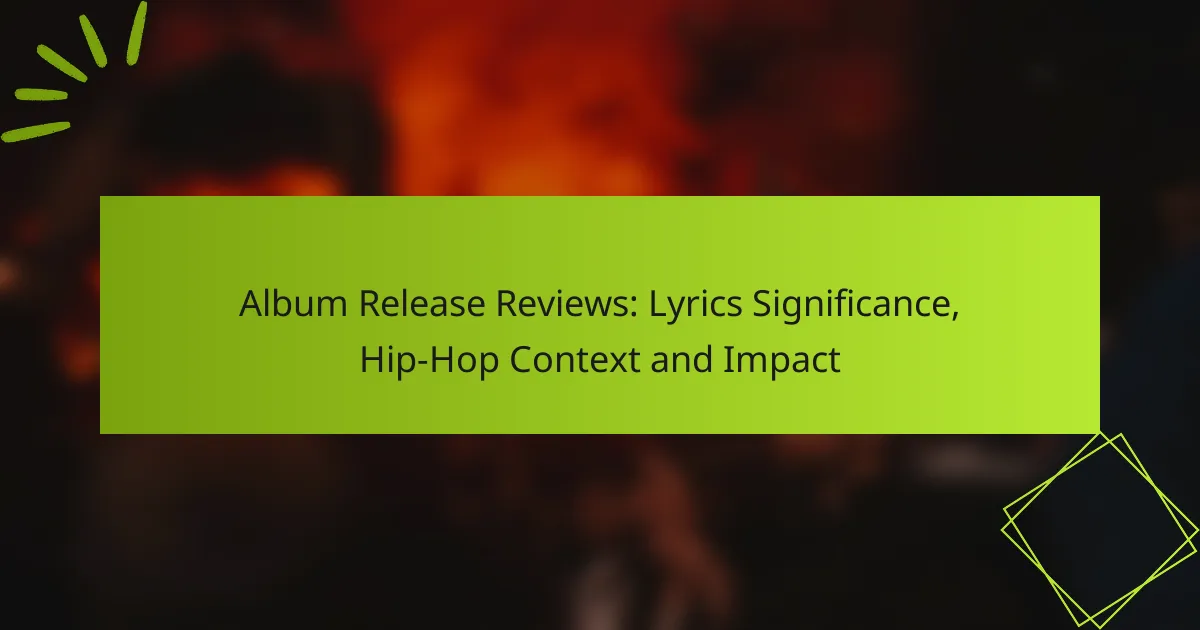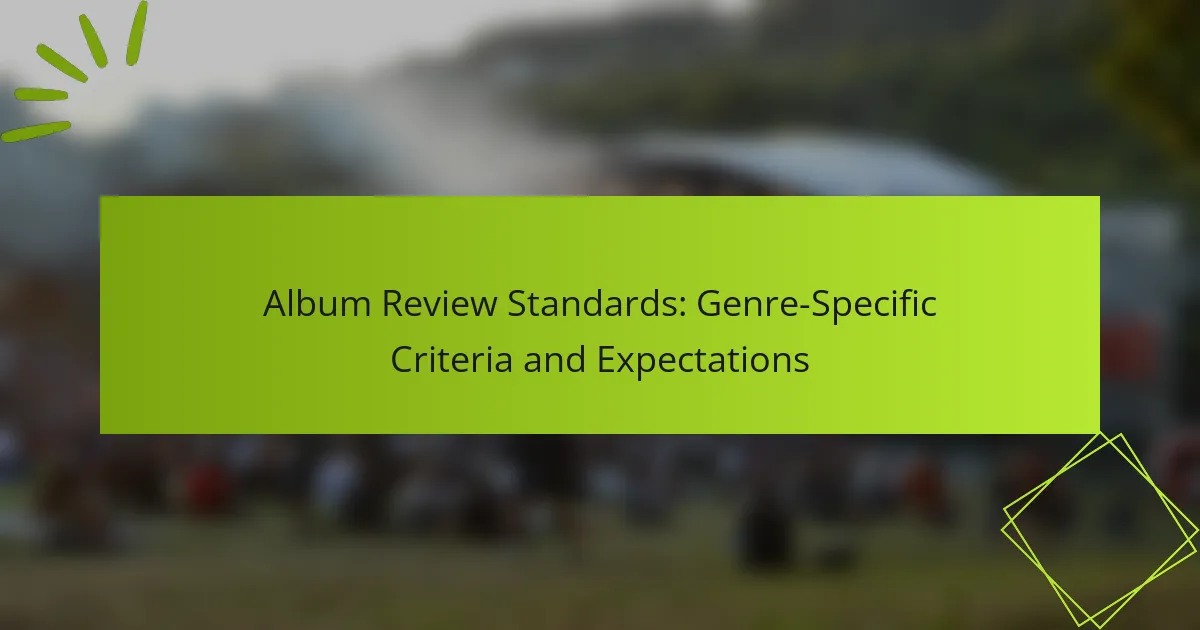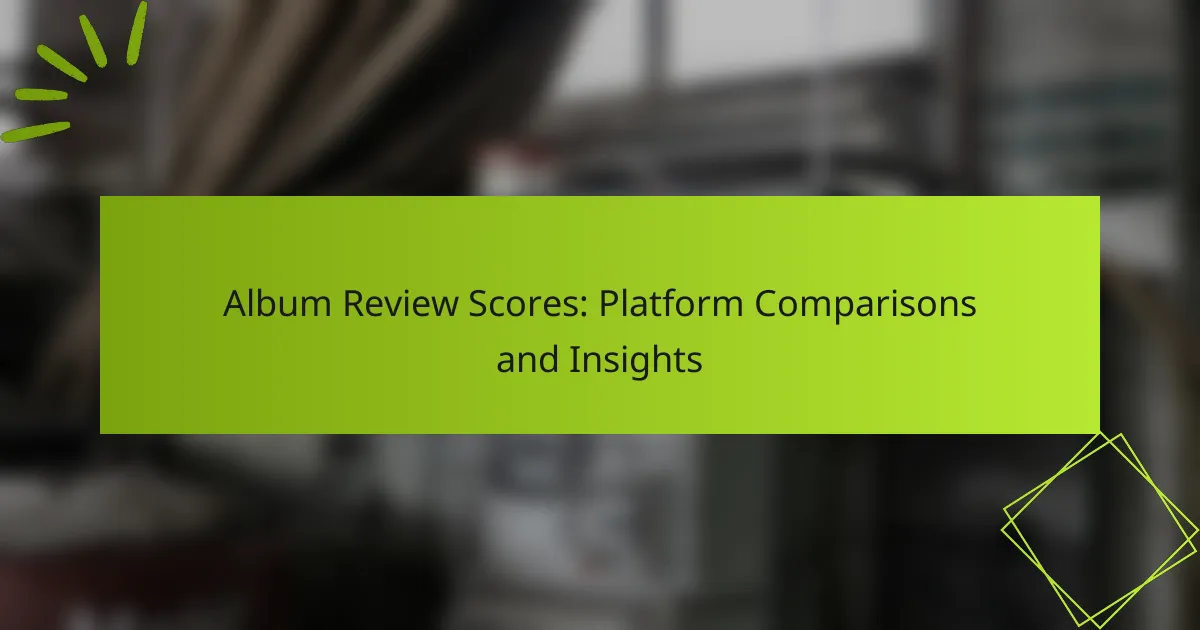Album release reviews play a pivotal role in shaping hip-hop culture, influencing everything from artist reputations to commercial success. The significance of lyrics in these albums cannot be overstated, as they encapsulate the artist’s emotions and experiences, fostering a deep connection with listeners. Renowned platforms like Pitchfork and Rolling Stone provide diverse insights, impacting how albums are perceived within the broader cultural context.
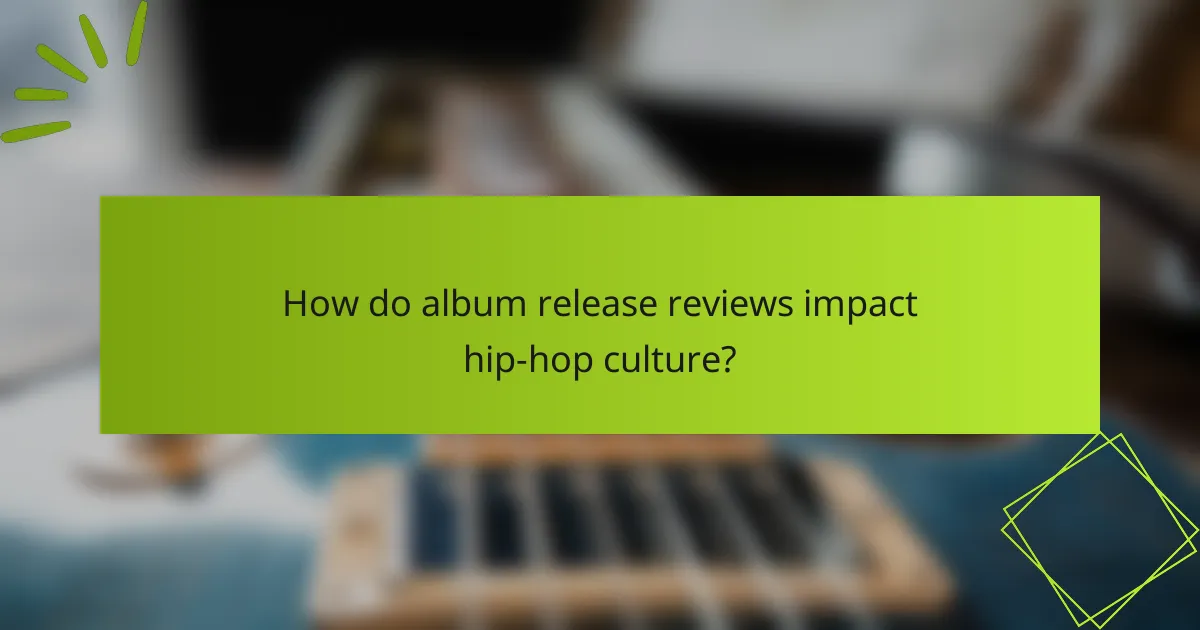
How do album release reviews impact hip-hop culture?
Album release reviews significantly shape hip-hop culture by influencing artist reputations, public perceptions, and commercial success. These reviews can determine how an album is received both critically and commercially, impacting everything from streaming numbers to award nominations.
Influence on artist reputation
Album reviews play a crucial role in establishing an artist’s reputation within the hip-hop community. Positive reviews can elevate an artist’s status, while negative critiques may lead to a decline in their perceived credibility. Artists often rely on critical acclaim to build their brand and connect with audiences.
For instance, a highly rated album can position an artist as a leader in the genre, while a poorly received project might result in a struggle to regain trust from fans and critics alike.
Shaping public perception
Public perception of an album is heavily influenced by reviews, which can frame how listeners interpret the music and its themes. Critics often highlight lyrical content, production quality, and overall artistry, shaping the narrative surrounding the release. This narrative can affect how fans engage with the music.
For example, if a review emphasizes an artist’s innovative approach to storytelling, it may encourage listeners to explore deeper meanings in the lyrics, enhancing their connection to the work.
Driving album sales
Positive reviews can significantly boost album sales, as many consumers rely on critics’ opinions when deciding what to purchase. A strong review can lead to increased visibility in stores and online platforms, translating to higher sales figures. Conversely, negative reviews can deter potential buyers.
In the competitive hip-hop market, even a few favorable reviews can lead to a surge in sales, especially during the first week of release when initial impressions are crucial.
Impact on streaming metrics
Streaming metrics are often influenced by album reviews, as positive feedback can lead to increased plays on platforms like Spotify and Apple Music. When an album garners critical acclaim, it is more likely to be featured in playlists, further driving its streaming numbers.
For instance, albums that receive high ratings may see a spike in streams shortly after release, reflecting the direct correlation between critical reception and listener engagement.
Role in award nominations
Album reviews can significantly impact an artist’s chances of receiving award nominations in the hip-hop genre. Critics’ assessments often contribute to the discussions surrounding eligibility and merit for prestigious awards, such as the Grammys or BET Hip Hop Awards.
A well-reviewed album is more likely to be recognized during awards season, as critics and industry insiders often reference these reviews when making nominations. This can lead to increased recognition and opportunities for the artist in the long term.
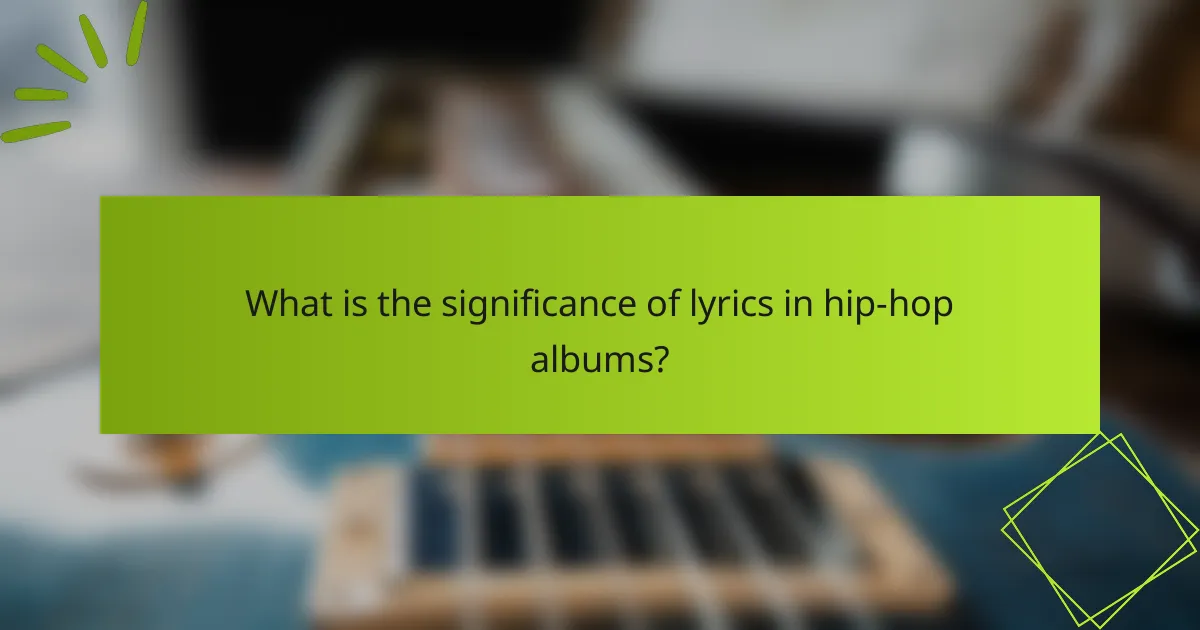
What is the significance of lyrics in hip-hop albums?
Lyrics in hip-hop albums are crucial as they convey the artist’s message, emotions, and experiences. They serve as a powerful medium for storytelling, allowing listeners to connect deeply with the artist’s journey and the broader cultural context.
Expression of personal narratives
Hip-hop lyrics often reflect the personal stories of artists, showcasing their struggles, triumphs, and everyday experiences. This storytelling aspect allows listeners to relate to the artist on a human level, creating a sense of empathy and understanding.
For instance, artists like J. Cole and Kendrick Lamar frequently draw from their own lives, discussing themes such as poverty, family dynamics, and personal growth. These narratives not only resonate with fans but also highlight the diverse experiences within the hip-hop community.
Social and political commentary
Many hip-hop lyrics serve as a platform for social and political commentary, addressing issues like systemic racism, police brutality, and economic inequality. Artists use their music to raise awareness and provoke thought, often inspiring movements and discussions around these critical topics.
For example, tracks like “Fight the Power” by Public Enemy and “Alright” by Kendrick Lamar have become anthems for social justice, illustrating how hip-hop can influence public perception and mobilize communities for change.
Use of metaphor and wordplay
The use of metaphor and wordplay in hip-hop lyrics adds depth and complexity to the music. Artists often employ clever language, puns, and double entendres to convey their messages in a more engaging and thought-provoking manner.
For instance, Eminem is known for his intricate rhyme schemes and layered meanings, which challenge listeners to unpack the lyrics for a fuller understanding. This artistic approach not only showcases the artist’s skill but also enhances the overall listening experience.
Connection to cultural identity
Hip-hop lyrics often reflect the cultural identity of the artist and their community, serving as a means of cultural expression and pride. This connection helps to preserve traditions and share experiences unique to specific groups.
Artists like Nas and Lauryn Hill incorporate elements of their heritage and community struggles into their lyrics, fostering a sense of belonging among listeners. This cultural resonance is vital for the genre, as it reinforces the importance of identity in the hip-hop narrative.

Which platforms provide the best album reviews?
Several platforms are renowned for their album reviews, each offering unique perspectives and insights. Key players include Pitchfork, Rolling Stone, Complex, and Metacritic, which cater to different audiences and preferences.
Pitchfork
Pitchfork is a leading music publication known for its in-depth album reviews and critical analysis, particularly in the indie and alternative genres. The site often provides context about the artist’s previous work and the cultural significance of the album.
Reviews typically feature a numerical score, which can influence public perception and sales. Pitchfork is particularly valued for its thoughtful critiques and the way it highlights lyrical themes and production quality.
Rolling Stone
Rolling Stone has a long-standing reputation in music journalism, offering comprehensive reviews that cover a wide range of genres. Its reviews often blend celebrity interviews and cultural commentary, making them appealing to a broader audience.
While the reviews may not always delve as deeply into the technical aspects of music, they provide valuable insights into the artist’s impact and the album’s place within the current music landscape.
Complex
Complex focuses on contemporary music, particularly hip-hop and R&B, providing reviews that resonate with younger audiences. The platform emphasizes cultural relevance and often includes multimedia elements like videos and social media interactions.
Complex’s reviews are typically more casual and relatable, making them accessible for fans who want to understand the album’s vibe and its connection to current trends in the music industry.
Metacritic
Metacritic aggregates reviews from various sources, providing a composite score that reflects the overall critical consensus on an album. This platform is useful for quickly gauging how an album is received across different critics.
While Metacritic does not provide in-depth analysis, it offers a clear snapshot of an album’s reception, which can help listeners decide whether to explore it further. The site also includes user scores, adding another layer of public opinion to the mix.

How do critics evaluate hip-hop albums?
Critics evaluate hip-hop albums by examining various elements such as lyrics, production quality, and artist performance. Each aspect contributes to the overall impact and significance of the album within the genre and its cultural context.
Lyric analysis
Lyric analysis focuses on the themes, storytelling, and wordplay within the songs. Critics look for originality, emotional depth, and how well the lyrics resonate with listeners. For example, an album that tackles social issues or personal struggles may be praised for its authenticity and relevance.
Additionally, the use of literary devices like metaphors and similes can enhance the lyrical quality. Critics often compare the lyricism to that of other artists, considering how well the artist’s voice and message align with the hip-hop tradition.
Production quality assessment
Production quality assessment evaluates the sound engineering, beat selection, and overall sonic landscape of the album. High-quality production typically features clear mixing, balanced instrumentation, and innovative beats that complement the lyrics. Critics may highlight collaborations with renowned producers as a factor in the album’s success.
Moreover, the genre’s trends influence production choices. For instance, a contemporary hip-hop album might incorporate trap beats, while a more classic approach may favor jazz or funk samples. Critics often discuss how these choices affect the album’s appeal and longevity.
Artist performance evaluation
Artist performance evaluation examines the delivery, flow, and vocal presence of the artist. Critics assess how well the artist’s style matches the album’s themes and production. A strong performance can elevate an album, making it more engaging and memorable for listeners.
Factors such as breath control, emotional delivery, and versatility in flow are crucial. Critics may also compare an artist’s performance on the current album to their previous work, noting any growth or changes in their artistic expression.
